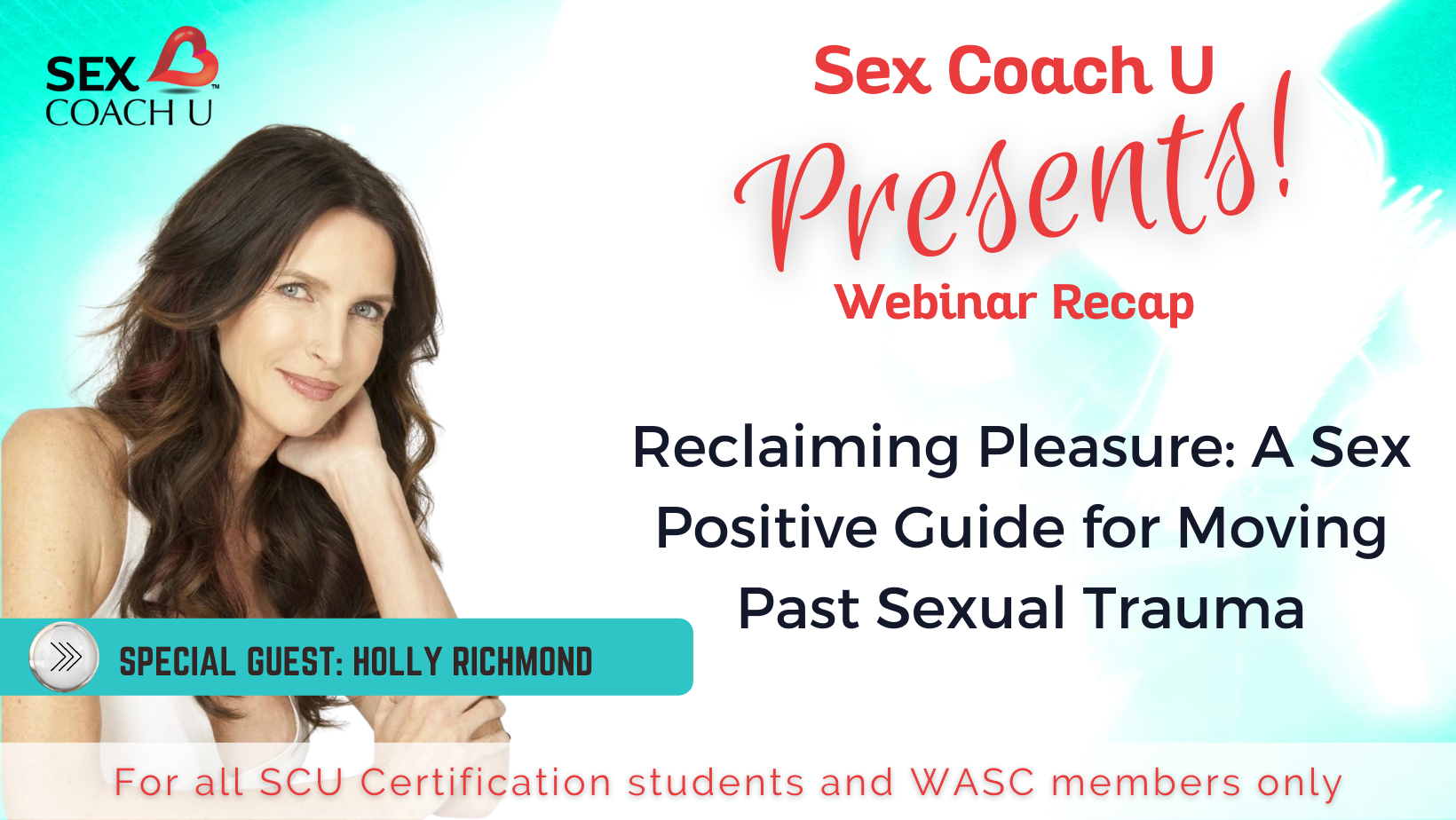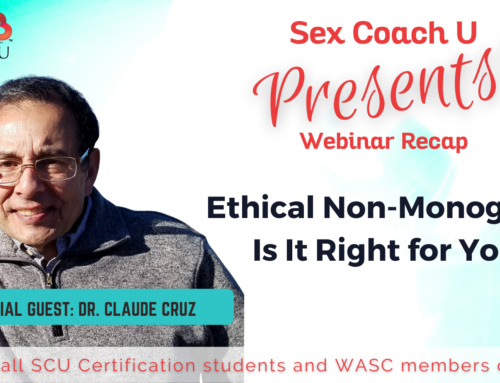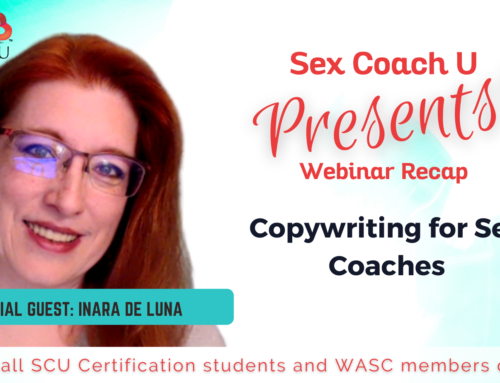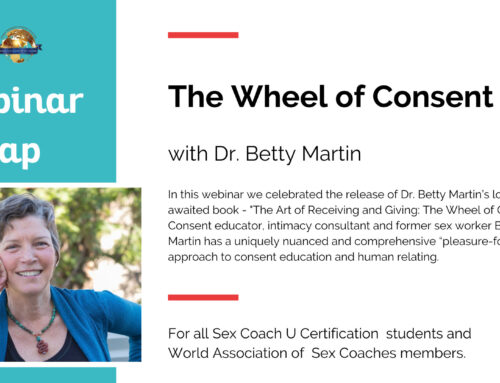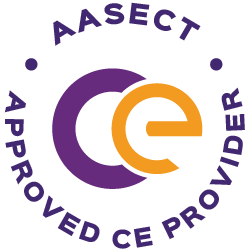Webinar: “Reclaiming Pleasure: A Sex-Positive Strategy for Helping Clients Move Through Sexual Trauma for Better Sex and Healthier Relationships”
Presenter: Dr. Holly Richmond
Air Date: January 5, 2022
*Our webinars are open to enrolled Sex Coach U students and current members of the World Association of Sex Coaches only. Click here for more information about enrolling in our program.
In this webinar, Dr. Holly Richmond presented her sex-positive strategy for helping clients move through sexual trauma to experience better sex and healthier relationships. Dr. Holly talked about the importance of using accurate language with our clients, the value of turning our clients toward pleasure and eros, and the transformative power of taking a psychosomatic approach with clients who have experienced sexual trauma. The information and suggestions she provided in the webinar gave us a model to effectively work with clients in our coaching practice who have experienced sexual trauma and to help us determine when we need to refer out to a therapist or other professional provider.
Dr. Holly is a Somatic Psychotherapist, Licensed Marriage and Family Therapist, and AASECT-Certified Sex Therapist. Her first book, Reclaiming Pleasure: A Sex-Positive Guide for Moving Past Sexual Trauma and Living a Passionate Life, was published last year. You can learn more about Dr. Holly at her website. Dr. Holly has dedicated her professional life to using a trauma-informed lens and sex-positive approach to help people move from trauma to surviving to thriving.
“Surviving is getting through life; thriving is enjoying it.”
Sexual Trauma and The Side Effects
Dr. Holly began the presentation by providing some facts and statistics about sexual trauma. She explained the differences in the terms sexual abuse, sexual harassment, and sexual violence. She gave us examples of the appropriate use of each of these terms. As sex coaches, we must understand what sexual trauma is and what it is not, so we come to our clients as informed professionals. And, since we are positioned on the front lines of sexual education and pleasure advocacy, we need to have a research-informed knowledge base of sexual trauma so we can clear up misconceptions about sexual trauma that are out there in the world.
Dr. Holly spent some time talking about many of the side effects of sexual trauma. She went over the emotional, physical, relational, and sexual side effects people face after traumatic sexual experiences. These side effects are some of the blocks and concerns that prompt our clients to seek sex coaching.
“When you heal your trauma, you heal your nervous system. When you heal your nervous system, you heal your body, and when you heal your body, you heal your mind.”
Reclaiming Pleasure After Sexual Trauma
One of the foundational beliefs of Dr. Holly’s strategy for working with clients who have experienced sexual trauma is that reestablishing sexual health must include reclaiming sexual pleasure. She acknowledged that some people who have experienced sexual trauma may not aim for sexual pleasure as a goal when they start their healing journey. For some clients, Dr. Holly suggested using eros as a starting point. “Eros,” Dr. Holly explained, “includes vitality, curiosity, creativity, fantasy, and other life-affirming and pleasure-generating pursuits.”
Dr. Holly went on to say we can help clients move through the side effects of sexual trauma and reclaim pleasure and eros by dismantling the blame and shame narratives. In addition to the somatic issues, it is about shifting from a victim to a survivor mindset to thrive.
“Eroticism can be sexual, but it doesn’t have to be.”
Dr. Holly’s Sex-Positive Strategy to Reclaim Pleasure
When working with clients to move through sexual trauma, Dr. Holly’s strategy is sex-positive, somatic-based, and client-centric. Dr. Holly explained how she approaches clients by moving from the bottom up. In the presentation, she provided some questions we can ask clients to guide them to tune into their somatic alarms. As she put it, working in this way helps clients “befriend the body to separate the past from the present.”
Dr. Holly’s strategy has several key aspects:
- Work with control. This includes somatic and written exercises to help clients understand how to know when to maintain control and when it is safe to relinquish control.
- Work with the pursuit of pleasure. This includes using desire, arousal, and self-pleasure practices to help clients know what is pleasurable for them and how to integrate it into their lives.
- Work with connection. This often includes daily connection practices to help our clients strengthen their relationship with themselves and others, which is crucial for healing and thriving.
- Work with fantasy. This is the cherry on top that encourages clients to explore, reimagine, and rewrite their erotic lives.
There are aspects of Dr. Holly’s approach that we can integrate into our sex coaching practices to help clients reclaim eros and pleasure whether or not they have experienced sexual trauma.
Dr. Holly is developing a companion course for her book, which is aimed at trauma survivors, the people who love them, and the professionals who work with them. Be the first to get updates on the release of this course by signing up here.
Curious about training to become a Certified Sex Coach™? Join the next live Info Session to meet the SCU team and participate in a live Q&A!
